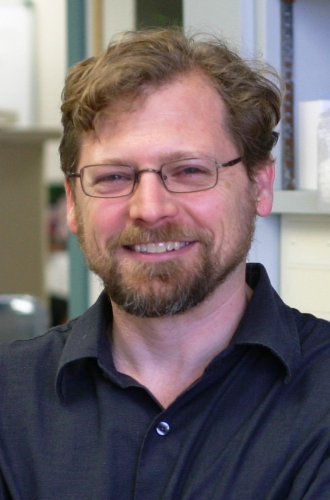-

-
Edward M Marcotte
Professor, Affiliated Faculty, Oden Institute
Molecular Biosciences, Oden Institute
Mr. and Mrs. Corbin J. Robertson, Sr. Regents Chair in Molecular Biology #1 (Holder)marcotte@utexas.edu
Phone: 512-232-3919
Office Location
POB
Postal Address
2500 SPEEDWAY
AUSTIN, TX 78712-
Hollaender Distinguished Postdoctoral Fellow, University of California, Los Angeles (2000)
Ph..D, National Science Foundation predoctoral fellow, University of Texas - Austin (1995)
B.S., National Merit Scholar, University of Texas - Austin (1990)Research Interests
Proteomics and bioinformatics
My group studies the large-scale organization of proteins, essentially trying to reconstruct the ‘wiring diagrams’ of cells by learning how all of the proteins encoded by a genome are associated into functional pathways, systems, and networks. We are interested both in discovering the functions of the proteins as well as in learning the underlying organizational principles of the networks. The work is evenly split between experimental and computational approaches, with the former tending to be high-throughput functional genomics and proteomics approaches for studying thousands of genes/proteins in parallel.
Bioinformatics for discovering protein function
We've discovered a number of features of genomes that allow us to predict functions for proteins that have never been experimentally characterized. Using these techniques and information from over 30 fully sequenced genomes, we were able to calculate the first genome-wide predictions of protein function, finding very preliminary function for over half the 2,500 uncharacterized genes of yeast. Now, with thousands of genomes in hand, we're extending these techniques, as well as asking basic questions about the evolution of protein interactions and the evolution of genomes.
Proteomics: High-throughput protein expression and interaction profiling
From work of ours and others, it is apparent that proteins in the cell participate in extended protein interaction networks involving thousands of proteins. We are interested in mapping these networks, measuring their dynamics, and using the networks to predict cell behavior and protein function. In the near term, we are developing mass spectrometry methods to measure absolute protein abundances and high-throughput microscopy methods to measure protein sub-cellular locations and activities, both of which allow us to test and extend the network models. In the long term, we would like to build a catalog of protein, mRNA and metabolite expression from cells grown under many different conditions, forming a quantitative picture of these molecular events inside cells. We expect that data of these sorts will put us on the road to developing predictive, rather than descriptive, theories of biology.
-
Representative Publications
McWhite CD, et al., A pan-plant protein complex map reveals deep conservation and novel assemblies, Cell, 181(2):460-474.e14 (2020)
Swaminathan J, et al., Highly parallel single-molecule identification of proteins in zeptomole-scale mixtures, Nature Biotechnology, 36:1076–1082 (2018)
Mallam A, Marcotte EM, Systems-wide studies uncover Commander, a multiprotein complex essential to human development, Cell Systems, 4:483-494 (2017)
Drew, K, et al., Integration of over 9,000 mass spectrometry experiments builds a global map of human protein complexes, Molecular Systems Biology, 13:932 (2017)
Session AM, et al., Genome evolution in the allotetraploid frog Xenopus laevis, Nature, 538:336–343 (2016)
Wan C, et al., Panorama of ancient metazoan macromolecular complexes, Nature, 525:339–344 (2015)
Kachroo AH, et al., Systematic humanization of yeast genes reveals conserved functions and genetic modularity, Science, 348(6237):921-925 (2015)
Li Z, Park Y, Marcotte EM, A bacteriophage tailspike domain promotes self-cleavage of a human membrane-bound transcription factor, the myelin regulatory factor MYRF, PLoS Biology, 11(8):e1001624 (2013)
Havugimana PC, et al., Census of human soluble protein complexes, Cell, 150:1068-1081 (2012)
Vogel C, Marcotte EM, Insights into the regulation of protein abundance from proteomic and transcriptomic analyses, Nature Reviews Genetics, 13:227-232 (2012)
Lee I, Blom M, Wang PI, Shim JE, Marcotte EM, Prioritizing candidate disease genes by network-based boosting of genome-wide association data, Genome Research, 21(7):1109-21 (2011)
McGary KL, et al., Systematic discovery of nonobvious human disease models through orthologous phenotypes, Proc Natl Acad Sci U S A, 107(14):6544-9 (2010)
Lee I, et al., Rational association of genes with traits using a genome-scale gene network for Arabidopsis thaliana, Nature Biotechnology, 28(2):149-156 (2010)
Tabor JJ, et al., A synthetic genetic edge detection program, Cell, 137(7):1272-1281 (2009)Narayanaswamy R et al. (2009) Widespread reorganization of metabolic enzymes into reversible assemblies upon nutrient starvation. Proc Natl Acad Sci U S A 106(25):10147-52
Li Z, et al., Rational extension of the ribosome biogenesis pathway using network-guided genetics, PLoS Biology, 7(10):e1000213 (2009)
Lee I, et al., A single gene network accurately predicts phenotypic effects of gene perturbation in Caenorhabditis elegans, Nature Genetics, 40(2):181-8 (2008)
Lu P, et al., Absolute protein expression profiling estimates the relative contributions of transcriptional and translational regulation, Nature Biotechnology, 25(1):117-24 (2007)
Levskaya A, et al., Synthetic biology: Engineering Escherichia coli to see light, Nature, 438(7067):441-2 (2005)
Lee I, et al., A probabilistic functional network of yeast genes, Science, 306(5701):1555-8 (2004)Fraser AG, Marcotte EM, A probabilistic view of gene function, Nature Genetics, 36(6):559-64 (2004)
Wan C et al. (2015) Panorama of ancient metazoan macromolecular complexes. Nature 525, 339–44
-
- Invention of the Year Award, University of Texas OTC, 2019
- Fellow of the American Academy of Microbiology, elected 2016
- NIH Director's Pioneer Award, 2012-2017
- Fellow of the Royal Society of Chemistry, elected 2012
- Fellow of the American Association for the Advancement of Science, elected 2011
- Edith and Peter O`Donnell Award in Science, 2008
- David and Lucile Packard Fellowship in Science and Engineering, 2002-2007
- Camille and Henry Dreyfus New Faculty Award, 2001
-



